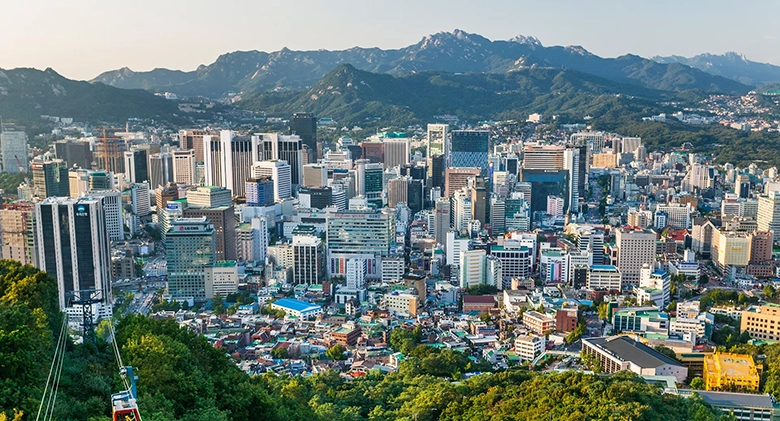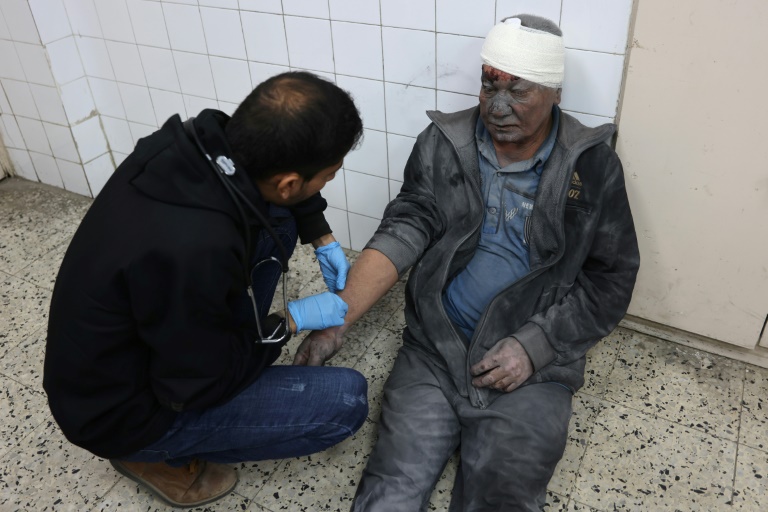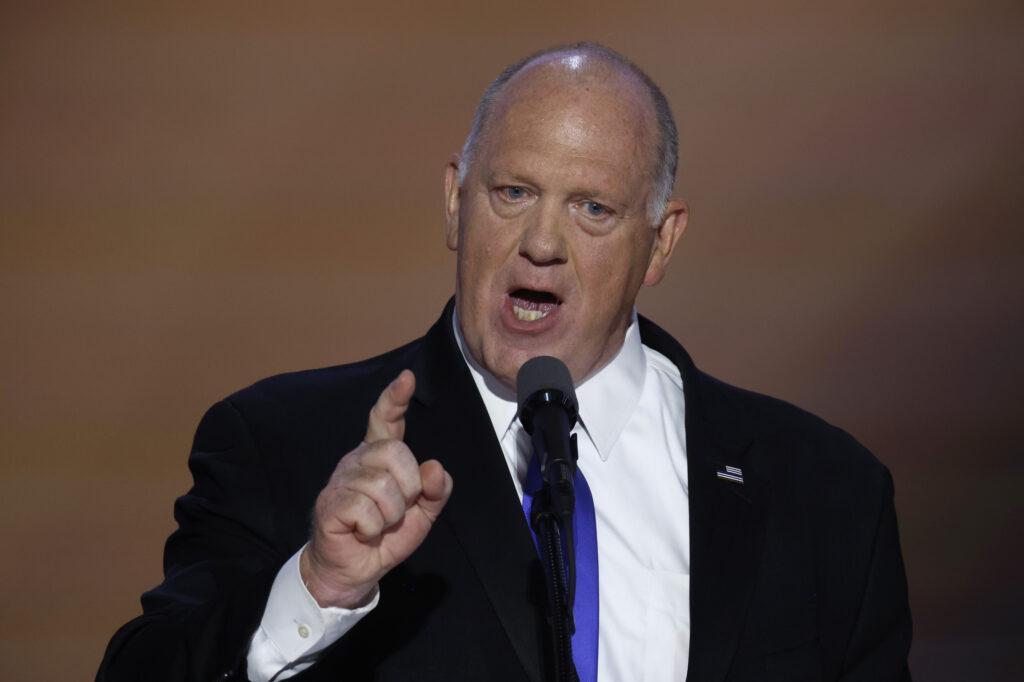News24 | Hezbollah Radwan Force commander Ibrahim Aqil killed in Israeli strike on Beirut
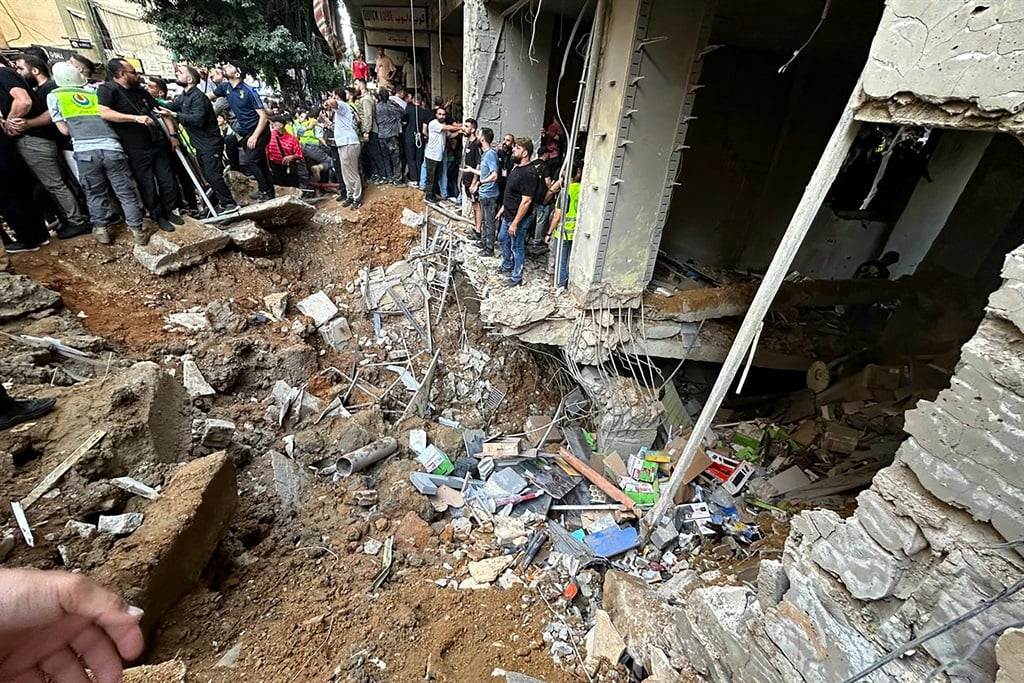
Top Stories Tamfitronics
- Israel killed Ibrahim Aqil, the commander of Hezbollah’s RadwanForce, in a strike on Beirut, which also resulted in 14 deaths and dozens ofinjuries.
- Aqil was wanted by the US for his involvement in the 1983bombing of the US embassy in Beirut.
- The strike on Aqil follows a series of explosionstargeting Hezbollah communication devices, which Hezbollah blamed on Israel.
Israel said Friday that it killed the commander ofHezbollah’s elite unit in a strike that Lebanese officials said left 14 deadand dozens wounded in the movement’s Beirut stronghold.
Ibrahim Aqil, who was wanted by the United States forinvolvement in the 1983 bombing of the US embassy in Beirut, headed theIran-backed militant group’s elite Radwan Force.
Hezbollah confirmed late Friday that Aqil had been killed byIsraeli fire, hailing him as “one of its great leaders”.
AFP journalists at the scene said the blast left a massivecrater and gutted the lower floors of a high-rise building in the Lebanesecapital’s southern suburbs.
Rescue workers were still using heavy equipment to searchthe rubble hours after the strike, AFPTV footage showed.
Aqil’s killing was the second of a senior Hezbollahcommander since the start of the war in Gaza. An Israeli strike on Beirut inJuly killed Fuad Shukr, a top operations chief for the movement.
It also followed two waves of explosions, on Tuesday andWednesday, of communication devices used by Hezbollah members, which Hezbollahblamed on Israel.
Those blasts killed dozens and left Hezbollah reeling whileshifting the focus of the Israel-Hamas war northward.
Stephane Dujarric, spokesperson for UN Secretary-GeneralAntonio Guterres, said the body was “very concerned about the heightenedescalation” and called for “maximum restraint” from all sides.
The Israeli military said it conducted a “targetedstrike” against Aqil, which also killed around 10 other senior Radwancommanders.
FOLLOW IT LIVE | DEVELOPING | Israel strike kills top Hezbollah commanders during a meeting
A source close to Hezbollah said Aqil was “at a meetingwith commanders” when he was killed.
Lebanon’s health ministry said that the attack killed atleast 14 people and wounded 66 more, and that it expected more bodies to befound.
The United States had offered a $7 million reward forinformation on Aqil, describing him as a “principal member” of anorganisation that claimed the 1983 embassy bombing, which killed 63 people.
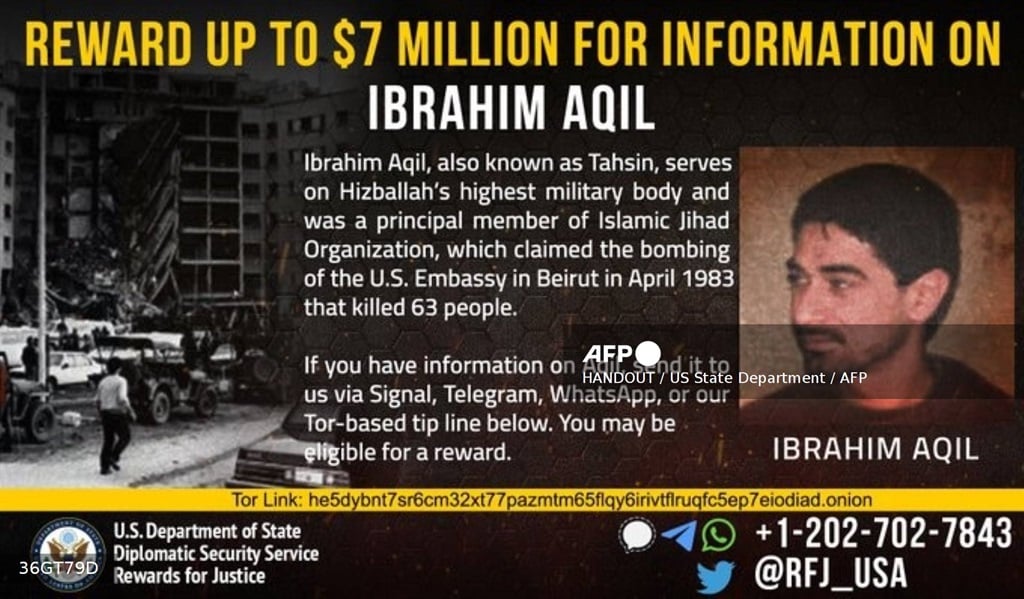
This undated image obtained from the US State Department shows a “Wanted Poster” for Hezbollah Radwan Force commander Ibrahim Aqil. A source close to Hezbollah told AFP that an Israeli air strike on 20 September 2024, killed Aqil, while the Israeli military said it conducted “a targeted strike” on the Lebanese capital. (Handout / US State Department / AFP)
Spearhead
Israeli troops and Hezbollah fighters have battled eachother along the Israel-Lebanon border since Hamas militants triggered the warin Gaza with their 7 October attack.
The focus of Israel’s firepower for nearly a year has beenon Gaza, but with Hamas much weakened, the focus of the war has moved toIsrael’s northern border.
Defence Minister Yoav Gallant said the countries'”enemies” would find no refuge, “not even the Dahieh inBeirut,” a reference to the city’s southern suburbs.
An Israeli military spokesperson, Rear Admiral DanielHagari, said after the strike that Israel was “not aiming for a broadescalation in the region”.
But Hamas called it a “brutal and terroristaggression” and an “escalation”.
Iran’s foreign ministry accused Israel of seeking to”broaden the geography of the war”.
Months of near-daily border clashes have killed hundreds inLebanon, most of them fighters, and dozens in Israel, forcing tens of thousandson both sides to flee their homes.
The latest blow to Hezbollah came after thousands ofHezbollah operatives’ pagers and walkie-talkies exploded over two days, killing37 people and wounding thousands more.
Hezbollah chief Hassan Nasrallah vowed on Thursday thatIsrael would face retribution for those blasts.
Earlier Friday, Israel said Hezbollah had fired dozens ofrockets from Lebanon following airstrikes that destroyed dozens of the militantgroup’s launchers.
Speaking to troops on Wednesday, Gallant said”Hezbollah will pay an increasing price” as Israel tries to”ensure the safe return” of its citizens to border areas.
“We are at the start of a new phase in the war,”he said.
Aqil’s Radwan Force spearheaded Hezbollah’s groundoperations and Israel has repeatedly demanded through international mediatorsthat its fighters be pushed away from the border.
‘Fear of wider war’
Israeli Prime Minister Benjamin Netanyahu delayed by a dayhis scheduled departure to the United States, where he is due to address theUnited Nations General Assembly.
On Friday the UN’s High Commissioner for Human Rights,Volker Turk, told the Security Council that the attack on Hezbollahcommunications devices violated international law and could constitute a warcrime.
The pagers and walkie-talkies exploded as their users wereshopping in supermarkets, walking on streets and attending funerals, plungingthe country into panic.
“I am appalled by the breadth and impact of theattacks,” said Turk, adding that it “is a war crime to commitviolence intended to spread terror among civilians”.
Earlier Friday, Hezbollah said it targeted at least sixIsraeli military bases with salvos of rockets after bombardments that people insouth Lebanon described as among the fiercest so far.
Residents of Marjayoun, a Lebanese town close to the border,said the overnight bombardment was among the heaviest since the border clashesbegan last October.
“We were very scared, especially for mygrandchildren,” said Nuha Abdo, 62. “We were moving them from oneroom to another.”
Clothing store owner Elie Rmeih, 45, counted more than 50strikes.
“It was a terrifying scene and unlike anything we haveexperienced since the escalation began,” he said. “We live in fear ofa wider war.”
International mediators, including the United States, havebeen scrambling to stop the Gaza war from turning into an all-out regionalconflict.
Hamas’s 7 October attacks that sparked the Gaza war resultedin the deaths of 1 205 people, mostly civilians, on the Israeli side, accordingto an AFP tally based on Israeli official figures that include hostages killedin captivity.
Out of 251 hostages seized by militants, 97 are still heldin Gaza, including 33 the Israeli military says are dead.
Israel’s retaliatory military offensive has killed at least41 272 people in Gaza, most of them civilians, according to figures provided bythe Hamas-run territory’s health ministry. The United Nations has acknowledgedthe figures as reliable.
Discover more from Tamfis Nigeria Lmited
Subscribe to get the latest posts sent to your email.



 Hot Deals
Hot Deals Shopfinish
Shopfinish Shop
Shop Appliances
Appliances Babies & Kids
Babies & Kids Best Selling
Best Selling Books
Books Consumer Electronics
Consumer Electronics Furniture
Furniture Home & Kitchen
Home & Kitchen Jewelry
Jewelry Luxury & Beauty
Luxury & Beauty Shoes
Shoes Training & Certifications
Training & Certifications Wears & Clothings
Wears & Clothings











